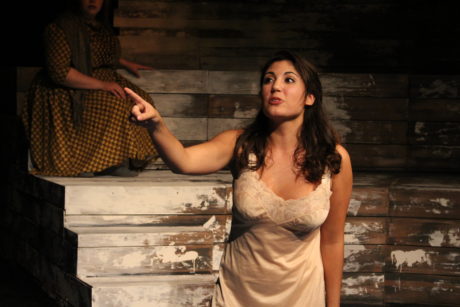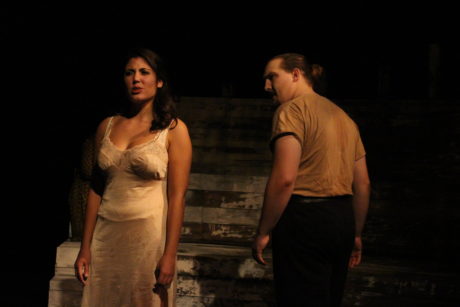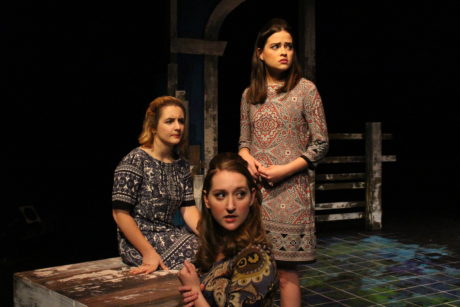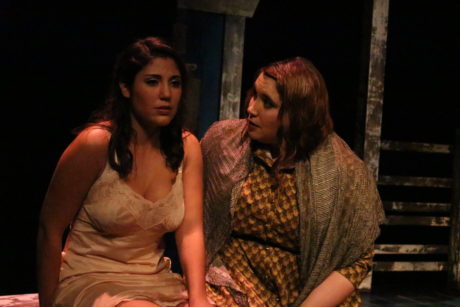A play from the 1980s about revenge for a rape, based on an ancient story from Greek mythology, comes alive in a student production as though it was about now. As though everything in it about how sexual assault silences women is as true today as then. As though the play’s depiction of how rape entrenches women’s subordination and secures men’s hegemony goes back thousands of years and has not much budged.
The play is Timberlake Wertenbaker’s The Love of the Nightingale, which in a bold stroke Shirley Serotsky chose to direct toward her M.F.A. degree at Catholic University. The production she has staged in the Callan blackbox is every bit as inspired as her impressive body of work with professional companies. Serotsky’s notably insightful handling of sexual-political themes (as with Rapture, Blister, Burn at Round House and Yentl at Theater J) is on eloquent display.

The original Greek myth, which Wertenbaker has amplified, is about two sisters, Procne (Morgan Wilder) and Philomele (Sara Romanello), whose bond is deep. When Procne is married off to a king, Tereus (Chris Doyle), whom she does not love, the sisters are separated. Procne longs for Philomele and implores Tereus to bring Philomele to her. He agrees to, but while doing so attempts to seduce Philomele, and when she refuses him rapes her, brutally. In the end, the sisters get revenge, gruesomely.
The first tableau is stunning. It happens on a terrific set designed by Jonathan Dahm Robertson that evokes a weatherbeaten wooden ship. We hear sea sounds, designed by Evan Cook. The light, designed by Tim Donahue, is like the night at sea. A crew of male sailors stand swaying back and forth, synchronized, as on the deck of a ship under sail. An older woman sits forlornly.

We don’t yet know how this indelible stage picture fits into the play, but we will. It is the voyage meant to bring Philomele back to Procne. But it has become the scene of a sex crime. The forlorn woman is Philomele’s nurse Niobe (Desiree Chappelle). Her charge is now Tereus’ victim.
The production is loaded with standout moments. The play proper begins with the two sisters as young girls, talking brightly and delightfully about sex and sharing their limited knowledge about what men are like (“spongy,” says one). As the play darkens, they learn far more.
A chorus of women appear as a catty sorority, wearing matching 50s print dresses, designed by Gail Beach, One of them flips idly through a period Life magazine. They signal snobbish exclusivity. And like the sailors we saw at sea, they too are synchronized; they cross and recross their legs exactly the same

There’s a wonderful play within the play, Phaedra, staged on the set that now serves as an amphitheater. The action functions as a foreboding of the rape but includes surprising humor, as for instance John Jones’s enjoyable turn as a campy Aphrodite.
When Philomele realizes she is the target of Tereus’ lust, she is counseled by her nurse to yield to his advances. “It’s easier that way,” Niobe advises, with weary resignation. But Philomele will have none of it and speaks out fiercely about her right to her integrity and independence.
The rape scene itself is difficult to watch. The sexual violence choreography by Kristin Pilgrim is exceedingly graphic and Romanello and Doyle execute it excruciatingly.
In the aftermath, the male sailors acknowledge that they were passive bystanders to the rape. “We said nothing,” one says. “It was better that way.”

Then there’s a scene where Philomele verbally lets Tereus have it. As he (somewhat unbelievably) stays silent, Romanello delivers Philomele’s rage at him, a withering takedown, with showstopping force. And in confronting him, she confronts head-on a major rape myth: “It was your act,” she says. “I caused nothing.” This is the play’s towering moment of female empowerment, but Tereus gets even. He cuts out her tongue. So she can no longer speak.
Tereus gets his comeuppance, however. Philomele and Procne see to that, their sisterhood never wavering. Finally, to halt the chain of carnage, the gods intervene and turn Procne, Philomele, and Tereus into birds (Philomele becomes the nightingale of the title). This is not really a resolution, of course, though it was in ancient Greece. Today it plays less as an ending and more as a timeout, to reflect on what needs to happen next.
The entire cast performed commendably, with energy and conviction. They seemed to be on board at a deep level with the contemporary portent of the play. The Love of the Nightingale at Catholic University is a superb production of a powerful and timely play that will surely prompt difficult conversations about, among other things, the role of male bonding in sustaining rape culture, the fact of sororicidal complicity among women, and the ongoing reality that women who speak up and speak out are punished.
Nevertheless some persist.





